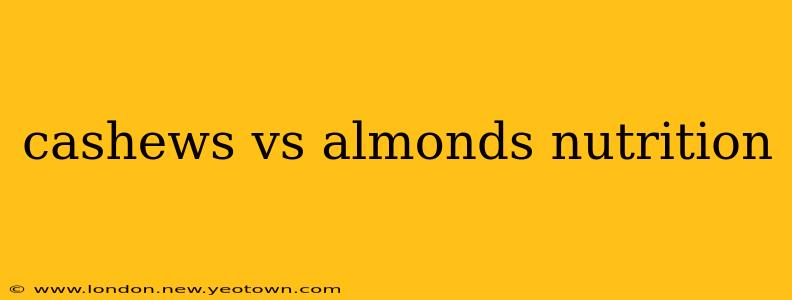The snack aisle beckons, and you're faced with a classic dilemma: cashews or almonds? Both are nutritional powerhouses, packed with healthy fats, protein, and fiber. But which one reigns supreme? This isn't just a matter of taste; it's a nutritional battle of titans. Let's delve into the details and explore the differences between these two popular nuts.
What are the main nutritional differences between cashews and almonds?
This is the central question, and the answer isn't a simple "one is better." Both cashews and almonds offer a unique nutritional profile. Cashews are generally higher in fat, particularly unsaturated fats beneficial for heart health. However, almonds boast a higher protein content and a greater concentration of fiber. Think of it like this: cashews provide a richer, creamier energy boost, while almonds offer a more sustained, protein-fueled power-up. The best choice for you depends on your individual dietary needs and goals.
Which nut has more protein?
Almonds win this round. A serving of almonds packs significantly more protein than an equivalent serving of cashews. This makes almonds a better choice for those looking to increase their protein intake, particularly vegetarians or vegans seeking plant-based protein sources.
Which nut has more healthy fats?
While both are rich in healthy fats, cashews edge out almonds in this category. Cashews contain a higher percentage of monounsaturated and polyunsaturated fats, which are linked to improved heart health and cholesterol levels. However, the difference isn't drastic, and both nuts contribute significantly to a healthy fat intake.
Which nut is higher in fiber?
Almonds take the lead again, offering a more substantial fiber content. Fiber is crucial for digestive health, helping to regulate bowel movements and promote satiety, which can aid in weight management.
Which nut has more magnesium?
Both almonds and cashews are good sources of magnesium, a mineral essential for numerous bodily functions, including muscle and nerve function, blood sugar control, and blood pressure regulation. However, almonds generally contain slightly more magnesium than cashews.
Which nut is better for weight loss?
Neither nut is inherently "better" for weight loss. Both can be part of a healthy weight-management plan, but portion control is key. The higher fiber content in almonds might contribute to a greater feeling of fullness, potentially aiding in calorie control. However, the healthy fats in both nuts provide sustained energy, preventing energy crashes that can lead to overeating.
Are there any significant differences in their vitamin and mineral content?
Yes, while both are nutrient-dense, there are subtle differences. Almonds tend to be richer in vitamin E, a powerful antioxidant, while cashews offer a higher concentration of copper, vital for iron absorption and nerve health. Both nuts provide a range of other essential vitamins and minerals, making them valuable additions to a balanced diet.
Conclusion: The cashew vs. almond debate is a matter of personal preference and dietary needs.
Ultimately, the "better" nut depends on your individual goals and preferences. Both cashews and almonds offer a multitude of health benefits, making them excellent choices for a healthy snack or addition to meals. Consider incorporating both into your diet for a diverse range of nutrients! Don't be afraid to experiment and find which nut you enjoy most and which best fits your nutritional requirements.

